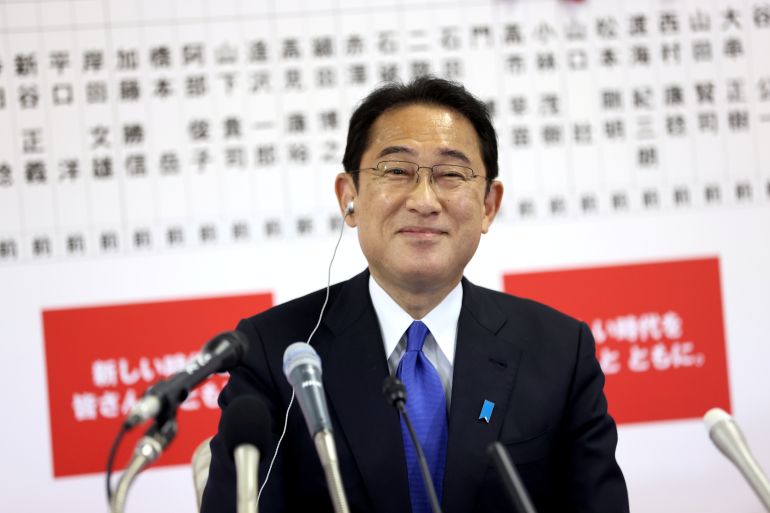Japan: Kishida’s coalition wins absolute majority in parliament
The Liberal Democratic Party and Komeito secure 291 seats in 465-member house.

Japanese Prime Minister Fumio Kishida’s coalition has secured a comfortable majority in Sunday’s parliamentary election.
Defying some predictions, Kishida’s Liberal Democratic Party (LDP) claimed 259 seats in the 465-member lower house, a result that gives the party an absolute stable majority and control over parliamentary committees.
Keep reading
list of 4 itemsJapan election: Ruling LDP struggles over COVID, inequality
Japan’s ruling LDP on defensive ahead of parliamentary polls
China, Russia naval ships jointly sail through Japan strait
The LDP’s junior coalition partner Komeito won 32 seats, according to the final but not yet official results.
Together, the two parties’ share of seats in the lower house is 291, well above the majority of 233 that Kishida had aimed for.
“The lower house election is about choosing a leadership,” the prime minister said late on Sunday. “I believe we received a mandate from the voters.”
Despite its comfortable win, the LDP did lose 17 seats from its pre-election share, including in single constituencies held by influential party members, such as Secretary-General Akira Amari, who was stung by a past bribery scandal.
Amari offered to resign even though he eventually secured his seat in proportional representation.
Kishida, who has only been in power for a month, said the losses were in part due to opposition parties’ strategy of fielding unified candidates in many single-seat electoral districts, but also because of voters’ judgement of his predecessors over the past four years.
‘In favour of stability’
Kishida became Japan’s prime minister last month after winning a leadership race in his ruling party when his predecessor Yoshihide Suga resigned amid public frustration over his handling of the coronavirus pandemic.
A soft-spoken former banker who has yet to stamp his mark on the prime ministership, Kishida has hewed to traditional policies of the party’s right-wing, pushing to increase military spending to counter a more assertive China.
He has also promised to address wealth inequality, touting a “new capitalism” as the world’s third-largest economy struggles to rebound from the coronavirus pandemic.
“The overall trend is in favour of stability. The LDP cleared the hurdles it absolutely had to,” said Tobias Harris, senior fellow at the Center for American Progress.
“We’ll see a lot of stimulus,” he said.
In Sunday’s vote, five opposition parties together lost 10 seats as their strategy of unifying candidates in most single-seat constituencies backfired, apparently because the Japanese Communist Party was included in their united front.
The largest opposition, the Constitutional Democratic Party of Japan (CDP), lost 13 seats to 96, and the communists lost two seats, retreating to 12.
The opposition has long struggled to win enough votes to form a government after a brief rule of the now-defunct centre-left Democratic Party of Japan from 2009 to 2012, as they have not been able to present a grand vision for the country.
A big winner was the right-wing Ishin, or the Japan Innovation Party, which nearly quadrupled its seats to 41, rising to the third biggest party.
Despite the party’s previous stance close to the LDP, its growing criticism of both the ruling and opposition blocs catered to voters who wanted a change from the LDP but found the opposition bloc uncomfortable, experts say.
Kishida pledges to ‘move quickly’
Kishida’s immediate task has been to rally support for a party weakened by Suga’s perceived high-handed approach to pandemic measures and his insistence on holding the Tokyo Olympic Games despite widespread opposition because of a high number of COVID-19 cases, which have since dropped sharply.
Kishida repeatedly stressed his determination to listen to the people and address criticism that the nine years led by Suga and his influential predecessor Shinzo Abe had fanned corruption, tamed bureaucrats and muzzled opposing opinions.
The prime minister said late on Sunday that he planned to reappoint the same members to his post-election Cabinet to speed up the work on a supplementary budget by the end of this year so that he can fund an economic package to provide support for the people and businesses hit by the pandemic.
“I will take concrete steps to achieve our policies as soon as possible,” Kishida said. “I need to move quickly.”
Before working on those, Kishida said he was heading to Glasgow to attend the COP26 summit on Tuesday. “It’s a global issue for all mankind, and Japan has to take our responsibility,” he said.